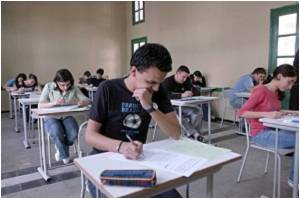University of Chicago scientists have shown that students can combat test anxiety and improve performance by writing about their worries immediately before the exam begins.

The writing exercise allowed students to unload their anxieties before taking the test and accordingly freed up brainpower needed to complete the test successfully - brainpower that is normally occupied by testing worries, explained the study's senior author, Sian Beilock.
They also predicted that just one round of writing immediately before a big event would be sufficient to curb choking and boost students' test scores.
To test those ideas, researchers recruited 20 college students and gave them two short math tests. On the first test, students were told simply to do their best.
Before the second test, researchers created a situation designed to produce stress, by saying students who performed well would receive money and that other students were depending on their performance as part of a team effort.
Students also were told that their work would be videotaped, and that math teachers would review it.
Advertisement
"The expressive writing group performed significantly better than the control group," the authors wrote.
The findings appeared in the Jan. 14 issue of Science.
Source-ANI








